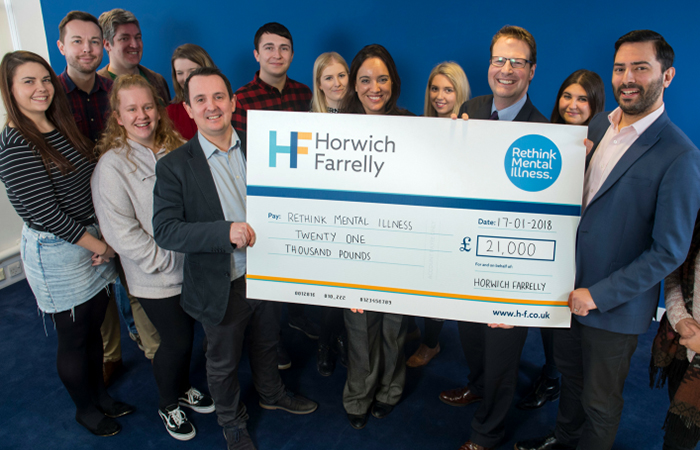
Law firm Horwich Farrelly has fully invested in its mental health strategy in a bid to destigmatise depression, anxiety and other forms of mental health in the workplace.
In October 2017, the organisation trained 18 employees to become mental health first aiders. These individuals were specifically selected from different levels, age groups and diversities to ensure there was a representative for every employee to feel comfortable talking to.
Horwich Farrelly wanted to create immediate, informal support for employees without the formalities of having to raise concerns with a line manager. The mental health first aiders, who have been trained by Mental Health First Aid England, are equipped with the skills to listen, as well as advise on the right support for any employee who is feeling depressed or suffering from any other type of mental health issues.
Liz Partington, HR director at Horwich Farrelly, says: “It’s been a dramatic change [in the workplace] […] It’s opened up conversations on the floors, it’s got [employees] talking about [mental health] and it’s given some transparency to it. [Employees] feel more comfortable on a general level around the building now and people are actually opening up to say they have had anxiety or they have had depression, whereas before there wasn’t that trigger. [Employees] now feel comfortable discussing their feelings on an informal level.”
The organisation ran a mental health-focused week during which the senior leadership team was tasked with writing pledges on how they would be improving their mental health. For example, Thomas Reynard, chief operating officer, vowed to have at least two walking meetings a week. These pledges were shared with employees and staff were encouraged to make their own private pledges.
Horwich Farrelly has a charity committee that has worked on actively creating events for the past 12 months to raise funds for mental health charity, Rethink Mental Illness, and has raised £21,000 (pictured above). Brad Carr, a HR advisor from the organisation’s Manchester office, cycled from London to Paris, raising £2,352 in the process. Other events have included 10 kilometre runs and Santa Dashes, charity assault courses, a coffee morning, and a five-a-side football tournament.
The organisation also used Blue Monday, which fell on 15 January 2018, allegedly the most depressing day of the year, as another opportunity to talk about mental health. Employees were encouraged to come into work in comfortable clothes such as onesies and big jumpers, and everyone was treated to hot chocolate and a comedy movie to boost morale.
Sending out communications about mental health and starting conversations on the subject are equally as important as the fun events, says Partington. “All line managers are encouraged to ‘switch off’ with their teams and to frequently have an informal chat over a cup of tea,” she says. “Opening up the conversation makes good business sense to a certain extent, if we can have people open to talk about [mental health] at the earlier stages, we can talk about flexible working, we can talk about counselling, [and] we can give them time to actually put the problems to bed at an early stage.
“When people keep these things to themselves they become a problem, and then what happens, we potentially get long-term absences if we haven’t had the interventions early enough. Hopefully we’ve created a comfortable place where [employees] can talk and a nice place to work.”